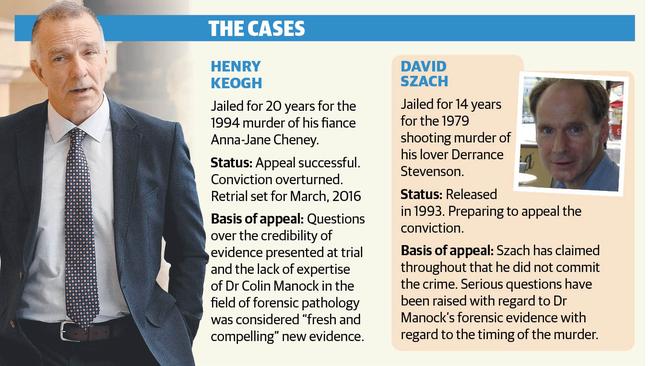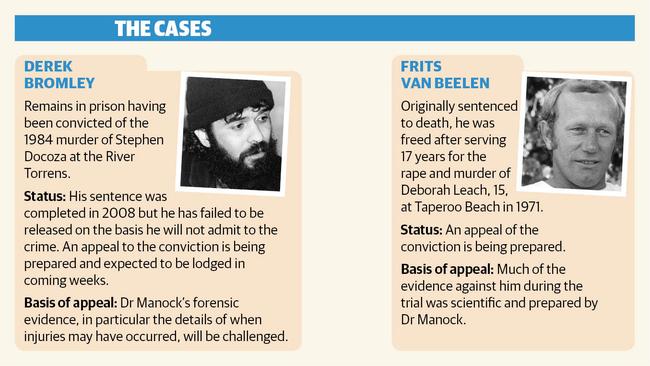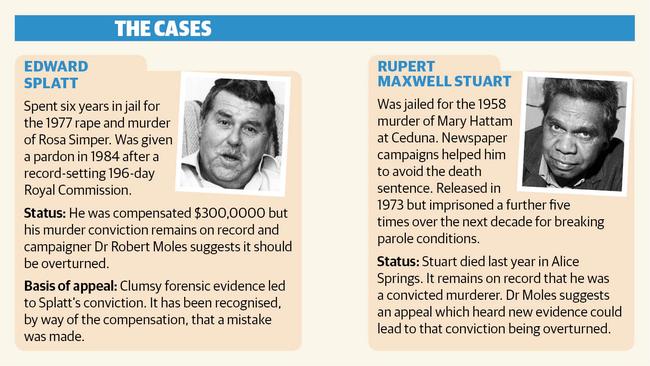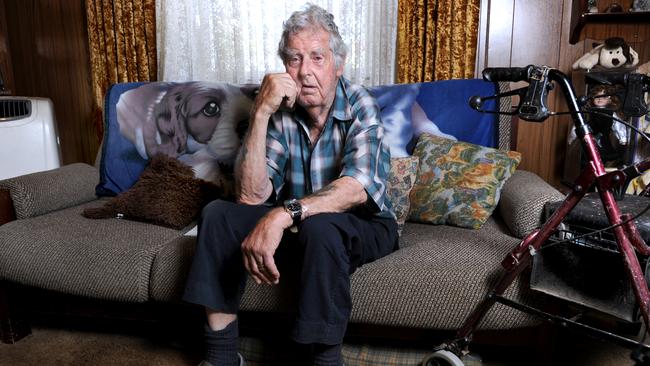SA murderers to appeal amid challenges to evidence by former pathologist Colin Manock
CONVICTED murderers are poised to launch a wave of criminal appeals challenging the evidence of former state chief forensic pathologist Dr Colin Manock in a bid to clear their names.

SA News
Don't miss out on the headlines from SA News. Followed categories will be added to My News.
- Henry Keogh’s murder conviction overturned
- Keogh to stand trial again for murder of Anna-Jane Cheney
- Edward Splatt: ‘Someone got away with murder’
CONVICTED murderers are poised to launch a wave of criminal appeals challenging the evidence of former state chief forensic pathologist Dr Colin Manock in a bid to clear their names.
At least 20 potential appeals are being worked on in the wake of Henry Keogh’s murder conviction being overturned and a retrial scheduled for next March.
The majority of those appeals will rely heavily on perceived flaws in the forensic evidence of Dr Manock, which was a crucial element of the successful Keogh appeal.
Former University of Adelaide law academic-turned-justice campaigner Dr Robert Moles said convicted murder Derek Bromley will lead the charge and is expected to lodge an appeal by the end of this month.
He has spent 30 years behind bars and is now at Cadell Training Centre.
He was convicted of the 1984 bashing murder of Stephen Docoza, 21, at the River Torrens and has refused to admit guilt despite it meaning he could have been released from prison up to 10 years ago.
Bromley’s appeal case will centre on an argument that Docoza’s body was immersed in water for five days and the injuries Dr Manock suggested led to his death could reasonably have happened post-mortem and not as a result of an assault which caused his death.

“Derek could, a couple of times, have admitted to the crime, said he’s sorry and walked from prison,’’ Dr Moles said. “But he does not wish to admit to a crime he maintains he did not commit and wants it proven he did not commit the crime.”
Free man David Szach, who was convicted of shooting his lover Derrance Stevenson, 44, in his home in 1979 and putting his body in a freezer, will lodge an appeal this year to have his conviction overturned.
And Frits Van Beelen, who was released in 1989 after served 17 years for the rape and murder of 15-year-old Deborah Leach at Taperoo Beach, will also appeal against his conviction.
Dr Manock provided forensic evidence supporting the convictions of all three men in the new challenges.
In an early 1970s industrial action brought on by Dr Manock when his position as the head of the unit was challenged, the Institute of Medical and Veterinary Science gave evidence that Dr Manock had no formal forensic pathology training.

The forensic evidence and expertise of Dr Manock — who retired as Senior Director of Forensic Pathology at the Forensic Science Centre in 1995 — has been repeatedly challenged in the courtroom since his retirement.
Recently retired legal practitioner Kevin Borick suggests all cases Dr Manock was involved with should be re-examined.
“And he should provide an explanation for his conduct, too,’’ Mr Borick said.
Dr Manock declined to speak to The Advertiser about the matters.
While dozens of appeal cases are being built to take advantage of the Statutes Amendment Appeals Act introduced in May 2013, there also families of victims still seeking justice who want to use questions over Dr Manock’s credibility as a forensic pathologist to have investigations reopened.
Dr Moles said he was aware of at least 20 cases where background work on appeals was under way. He also knows of at least two cases where families will challenge Dr Manock’s forensic pathology reports on their loved ones and are likely to seek the reopening of investigations into those deaths.

“The Statutes Amendment Appeals Act creates the right to a further appeal,’’ Dr Moles said.
“Previous to that Bill, once one appeal had been made, there was no right for further appeal or review of the case no matter what evidence came to hand. There was the petition process, but no legal right to appeal.
“Under the Act, introduced on May 5, 2013, where you have fresh and compelling evidence that there’s been a wrongful conviction, there is now a right to a second or subsequent appeals.’’
Dr Moles said the “fresh and compelling” evidence in many of the appeals being worked on were linked to perceived mistakes made by Dr Manock in collecting and presenting forensic evidence.
“The fact that Dr Manock’s evidence has been found to be incorrect and ‘not fit’ and that he has been discredited as an expert in the field is enough to stand as fresh and compelling new evidence and justify these appeals,’’ Dr Moles said.

He said that poor forensics work by others and the miscarriage of justice had also played out in the wrongful murder convictions of Edward Splatt for the 1977 murder of Rosa Simper in her Cheltenham home and Rupert Maxwell Stuart who was wrongly imprisoned for the 1958 murder of Mary Hattam at Ceduna.
Mr Stewart died last year in Alice Springs and Mr Splatt now has severe dementia and resides in a nursing home.
Dr Moles said the state owed it to the two men to now overturn their convictions.
“As for Ted Splatt, he was pardoned and they paid him $300,000 compensation. In my mind that is acknowledgment that he was wrongly convicted but it remains on the public record that he was convicted as a murderer.
“The very least the state can do when a wrongful conviction is on the record like that is for the conviction to be overturned on the record.”
“Ted isn’t in any condition to ask for that himself and it is too late for Max. Max died a murderer, as far as the record stands.”


